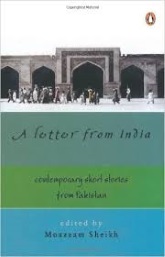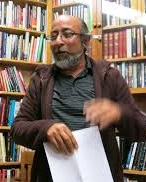A Letter from India: Contemporary Short Stories from Pakistan
Moazzam Sheikh

Paperback: 168 pages
|
Actually it is a whole lot of letters from men and women who I have never met and am only vaguely aware of their stature as writers of prose, fiction and poetry. I have an insatiable appetite for everything produced in the country which was once my homeland. I went through the entire menu offered by A Letter from India: Contemporary Short Stories from Pakistan,edited by Moazzam Sheikh (Penguin). Some were originally written in English, others translated from Urdu, Sindhi, Punjabi and Pushto. My first reaction was that the two-nation theory which was the basis for the demand for Pakistan was, and is, a lot of hogwash. Pakistanis are not only the same race as we Indians, they eat the same kind of food, speak the same language and have the same emotional reactions to inter-human relations as we Indians. However, Partition ushered in some differences in our respective linguistic maps. In India, English retains its predominance as the language of communication for the entire country. In Pakistan, English has receded into the background and Urdu effectively replaced it as the national language — a status Hindi never attained in India. In India regional languages flourish in their own regions; in many like Bengal, Tamil Nadu, Karnataka and Kerala, they have overtaken English. In Pakistan, regional languages like Sindhi, Saraiki, Punjabi and Pushto have dwindled and Urdu reigns supreme. As a consequence, Urdu has produced better poets, short-story writers and novelists than all the languages put together. Moazzam Sheikh’s compilation — including his own, an excellent piece of writing — relies heavily on Urdu contributions. The most outstanding among them is a Letter from India by Pakistan’s leading writer Intezar Husain. It is based on one lone letter from one Qurban Ali, living in some small town in Madhya Pradesh. It is dated October 15, 1974. They are a Shia family which has seen better days during the Raj. The focal point is the family cemetery, where their forefathers sleep in their graves festooned by haar-singaar creepers ever in full bloom. Comes Partition and some members of the once closely knit family go to seek their fortunes in neighbouring countries: Pakistan, East Bengal (later Bangladesh) and Nepal. Some fall in battlefields, some are killed in Hindu-Muslim riots in India, some in Shia-Sunni riots in Karachi. Others just faded out into the unknown. The world also changes: some women discard their burqas and modernise themselves, and horror of horrors some even marry non-Muslims. Haar-Singaar flowers wither over crumbling graves. The members of the family who had lived in peace with their Hindu neighbours sense a growing hostility towards them. Qurban Ali has much to reminisce about and mourn. He does so in terse, beautifully written prose. It is about the best that I have read on the tragedy we call Partition. Two other things about the compilation impressed me. A fair number of contributors are women; of them, two stand out: Soniah Naheed Kamal’s story Papa’s Girl written in English is as open about sexuality as any I have read. And Fahmida Riaz’s Hieroglyphics is as subtle as her poetry. The other pleasant surprise was to see two Pakistani Hindus included in the collection. Unfortunately, neither make good reading. The other things I learnt are from the introduction. According to Moazzam Sheikh, before the Gurmukhi script was evolved by the Sikh Gurus, Punjabi was written in a script called Shahmukhi. And that the most popular lines in Warris Shah’s Heer (Doli Charhdian maarian Heer Kookan, Manoon lai chaley Babla lae challey — as she got into the bridle palanquin, Heer cried out to her father, they are taking me away) were not composed by Warris Shah but some other poet many years later. The following Urdu short stories are included in A Letter From India: Contemporary Short Stories from Pakistan:
|

 Moazzam Sheikh
Moazzam Sheikh